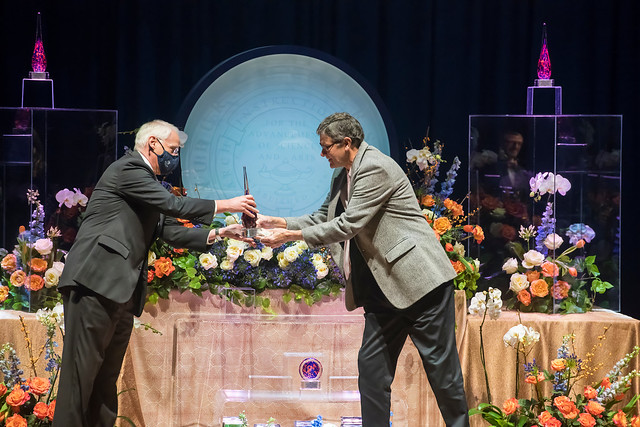Kinesiology professor’s world-renowned research earns him Creative Research and Scholarship Award
Article body
For more than 31 years, Bruce Gladden has been conducting research in Auburn University’s School of Kinesiology, and the results of his work have been studied and recognized internationally. Gladden, the director of the Muscle Physiology Lab and the Humana-Germany-Sherman Distinguished Professor of Education, is the recipient of the Creative Research and Scholarship Award. The award recognizes faculty members who have distinguished themselves through research, scholarly works and creative contributions.
“I feel incredibly honored to receive this award. I am particularly humbled by knowing who has won this award before me and who was on the selection committee,” Gladden said. “Beyond those groups, I am so privileged to have received support for my nomination from wonderful, distinguished colleagues. I have also had the good fortune to have served under two outstanding unit leaders, Drs. Mary Rudisill and Dennis Wilson. They have made it easy to do my job. My research has always been fun for me, but it is even more rewarding and encouraging when the university provides these types of recognition.”
Gladden’s career has focused on exercise energetics, lactate metabolism and the role of oxygen in metabolic processes in skeletal muscle during exercise. Of his 111 authored publications, one in particular – his single-authored “Lactate Metabolism: A New Paradigm for the Third Millennium” published in Journal of Physiology in 2004 – is one of the most cited papers in the field. With a paper that is considered the authoritative source on lactate and exercise, Gladden and his research have had a global scientific impact. His publications have yielded nearly 6,700 citations in total. He has also authored reference chapters in the American Physiological Society’s Handbook of Physiology and its resource journal, Comprehensive Physiology; additionally, he has received multiple regional, national and international awards for his research and professional activities.
Peers describe his work as directly relevant to understanding basic metabolism which could have implications for dysfunction and morbidity/mortality in major diseases such as heart failure, cancers and diabetes. He has collaborated with researchers around the world – including in the United States, Canada, Italy and Denmark.
“It is always inspiring to work with these incredibly intelligent and talented individuals,” he said. “As icing on the cake, they have also become lifelong friends.”
At Auburn, Gladden has obtained grant money and mentored students to success. He received the first and only two National Institutes of Health Research Project Grants in the College of Education.
“For more than 31 years, Dr. Gladden has been the prominent face of the School of Kinesiology; his name is quickly recognized for his scholarly and professional accomplishments in many locations around the globe,” said School of Kinesiology Director Mary Rudisill. “He is widely respected on the international stage as one of the leading experts in exercise energetics.”
Gladden’s interest in his field began when he was a college student. He played high school basketball and then was a walk-on player for the freshman basketball team at the University of Tennessee. After he was no longer on the team, he continued playing sports, working out and exercising.
“As a zoology major and chemistry minor, I took an exercise physiology class in the last term of my undergraduate studies, and I was hooked,” he said. “I was thrilled to have found an intersection between my interest in sports/physical activity and my interest in science.”
Now, he is the one helping college students find their passion in the same field. He has mentored 17 doctoral students to successful careers in industry and academia.
“The wonderful contributions of my doctoral students over the years and my work with them have been the most enjoyable and rewarding aspects of my career,” Gladden said.
Gladden credits his success to the support of his family, which includes his wife of 47 years, Cheryl, and two sons, two daughters-in-law and four grandchildren.
Related Media
Media interested in this story can contact Communications Director Preston Sparks at (334) 844-9999 or preston.sparks@auburn.edu.
Founded in 1915, the Auburn University College of Education enrolls 2,800 undergraduate and graduate students. Four academic units offer 60 degree options in teaching, special education, educational leadership, kinesiology, counseling, adult education, educational technology and educational psychology. The College is committed to diversity and inclusion and maintains a focus on outstanding teaching, consequential research and solution-oriented outreach in order to fulfill its mission of making a better world for all, including those most in need.






